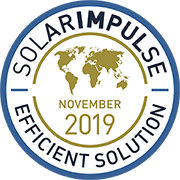The Solutions Explorer lets you create alerts that match your needs. You can create several alerts and you will receive a notification each time a new Solar Impulse Efficient Solutions is labelled and matches your filters.
Your Search Alerts will show up here.
Sign in to create alerts for your filters and search terms.
Sign inDon't have an account?
Sign upAccess exclusive opportunities for Investor Members Only
The Investment Hub is a platform by the Solar Impulse Foundation that connects innovators with investors to fund scalable and sustainable solutions. Through tailored matchmaking, e-pitches, and a collaborative digital environment, it helps drive impactful innovation forward.
Sign in to explore a world of dynamic and high-potential investment opportunities.
Sign inDon't have an account?
Sign upA water desalination system powered mechanically by waves as the only source of energy

A water desalination system powered mechanically by waves as the only source of energy
It is a solution that combines the resource (sea water) and the source of energy (waves) in the same system to make drinking water. The choice of wave energy to produce drinking water is based on the principle that it uses a very dense energy (waves) to transform the resource (seawater) which is the same element thus enabling a very simple technology to do so. The solution could be implemented for the need of a small communities of 500 peoples (1 buoy) or be combined in an array to provide for more as needed. Add buoys based on needs as population or touristic installations arise. The up and down wave movement on the buoys is used to draw water from the sea and pump it through reverse osmosis membranes, the osmosis process extract fresh and clean drinking water from the sea water. A small portion of the buoy’s pumping energy is used to pump water to the shore via an underwater pipe. The water is then redistributed locally by the user. Wave-powered desalination buoys is an all-in-one and the units also act as an artificial reef which can help restore some area through its eco-friendly anchoring.
Oneka Technologies
Oneka is devoted to make the ocean a sustainable supply of drinking water.
The information set out above, is solely for the purposes of information and the Solar Impulse Foundation does not provide any guarantee as to its authenticity, completeness or accuracy. This information does not constitute investment advice or a recommendation to buy into, transact or to enter into any agreement with any of the parties or persons mentioned above. Potential investors or interested parties are solely responsible for their investment or business decisions and for performing any due diligence required by the circumstances. The innovator Oneka Technologies has asserted ownership of the intellectual property rights for images, videos, and content showcased above, affirming full and unrestricted usage rights, and has provided explicit permission for the Solar Impulse Foundation to publish such information designated as "public" in the application form.